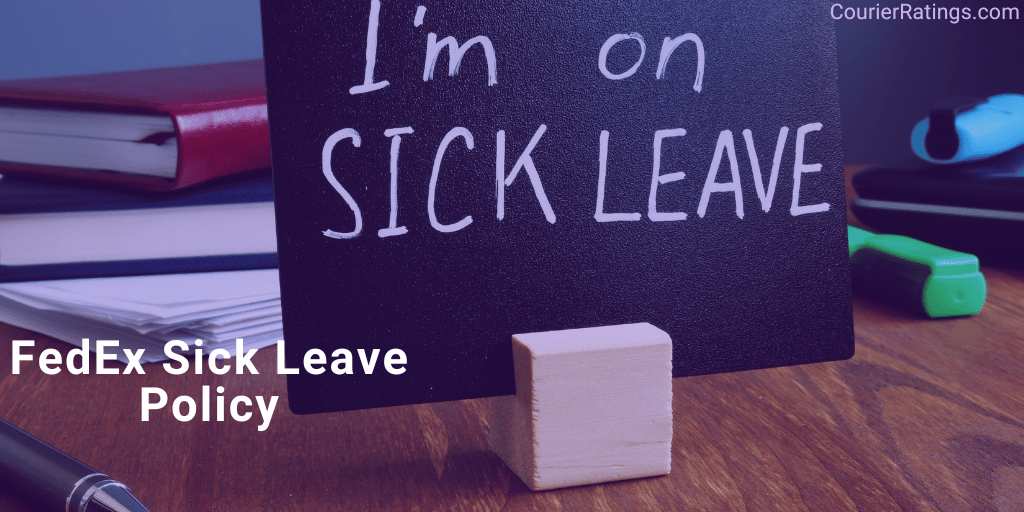Wonder how FedEx looks after employees when they get sick? FedEx gives both full-time and part-time workers paid time off to rest and recover. This policy shows how the company truly values its people, making sure no one has to worry about losing money while feeling under the weather. Knowing this can change how employees feel about their jobs and help keep the workplace healthier. Keep reading to discover why this approach can make a big difference for anyone working there.
Full-time employees are entitled to 40 hours of sick leave per year, while part-time employees receive 20 hours.
Additionally, the policy includes valuable provisions such as the Temporary Return to Work program and options for modified duty assignments, showcasing FedEx’s commitment to employee well-being.
Continue reading to explore more about FedEx’s comprehensive approach to promoting employee health and wellness.

Key Takeaways:
- Full-time workers are entitled to 40 hours of paid sick leave annually, while part-time employees receive 20 hours.
- Any accrued but unused sick leave can be converted into monetary compensation in July or carried forward to the following year.
- FedEx Ground staff accrue 1 hour of Paid Time Off (PTO) for every 20 hours worked, which becomes available after completing 90 days of employment.
- Employees are required to promptly inform their supervisor or Human Resources about their sick leave and may be requested to provide a medical certificate as per company policy.
What Is FedEx’s Sick Leave Policy?
FedEx offers a comprehensive sick leave policy tailored to different employment contracts and locations, encompassing benefits like paid sick days and even unlimited sick leave in some cases. For full-time FedEx Express employees, there is an allocation of 40 hours of sick pay annually, while part-time staff receive 20 hours per year.
Notably, any unused sick days are monetarily compensated in July, serving as a valuable employee perk. In specific scenarios, such as within UK express contracts, the sick leave provision is notably generous.
Employees can avail themselves of up to 80 days at full pay, followed by an additional 80 days at half pay within a rolling 12-month period. This extensive coverage demonstrates FedEx’s dedication to its workforce’s well-being.
Furthermore, reports indicate that FedEx extends the benefit of unlimited sick days to its employees, showcasing a commitment to flexibility and support. The overarching policy includes paid sick leave, with details subject to state and local regulations.
Employees can request sick leave via a standardized process, ensuring coverage for both personal and family-related health issues. This meticulous approach to sick leave management underscores FedEx’s efforts to meet diverse employee needs across various regions and contract types.
Does FedEx Have Sick Days?
FedEx provides comprehensive sick leave benefits to its employees worldwide, ensuring their well-being and financial security during illness. Full-time employees at FedEx Express are entitled to 40 hours (5 days) of paid sick leave annually, while part-time employees receive 20 hours (2.5 days).
In the UK, employees have even greater benefits, with 80 days of full pay followed by 80 days of half pay within a rolling 12-month period.
Furthermore, FedEx allows the carry-over of unused sick leave and covers absences related to the health issues of employees or their family members. The company also complies with local sick leave laws, although legal challenges have arisen in some regions.
To aid in the transition back to work after sick leave, FedEx offers a Temporary Return to Work (TRW) program that allows employees to gradually resume full duties within their medical limitations. This holistic approach to sick leave demonstrates FedEx’s commitment to supporting its employees’ health and recovery.
How Does FedEx Define a “Sick Day”?

FedEx’s approach to sick leave may not conform to traditional definitions. While the company does not explicitly designate ‘sick days,’ it offers personal and emergency days as part of its leave policy framework.
Employees at FedEx can take up to five unexcused absences, which are unpaid, instead of having a specific number of sick days allotted to them. This unique policy reflects a focus on flexibility and individual accountability while upholding employee rights.
Interestingly, FedEx has actively pursued exemptions from local sick-pay regulations due to its national business operations. Despite this, the company encourages reporting unsafe working conditions without specifically outlining sick day policies.
Strikingly, according to Glassdoor, FedEx provides unlimited sick days, a highly valued benefit among its employees.
In the UK, FedEx implements a more structured sick leave policy, offering 80 days of full pay followed by 80 days of half pay within a year.
For part-time employees in the U.S., two unpaid call-out days are permitted within a rolling thirty-day period, showing a nuanced approach to balancing company needs with employee entitlements to paid time off.
How Many Sick Days Are Allowed per Year Under FedEx’s Sick Leave Policy?
FedEx offers varying amounts of sick leave based on the employee’s contract type and location. In the United States, full-time FedEx Express employees receive 40 hours (or 5 days) of paid sick leave annually, while part-time employees are entitled to 20 hours (or 2.5 days) per year.
Unused sick leave is reimbursed to employees in July, providing flexibility in their paid time off (PTO) arrangements.
On the other hand, employees on an express contract in the UK receive a more generous allowance of 80 days of full pay, followed by 80 days of half pay within a rolling 12-month period.
New part-time hires at FedEx can take two days off without pay within a sliding 30-day window, showcasing the variability in leave entitlements based on employment status and location.
It’s essential to note that FedEx’s sick leave policy is subject to state and local laws, leading to variations in how leave is accrued and utilized. For specific details, employees should consult their HR department to understand their individual leave entitlements thoroughly.
This proactive approach ensures that all employees are well-informed about their sick leave benefits and rights.
What Is the FedEx Ground Sick Leave Policy?
FedEx Ground’s sick leave policy consolidates all paid time off (PTO) into a unified pool, enabling employees to use their accrued PTO for sickness, vacation, or emergencies after completing 90 days of employment.
This streamlined approach ensures flexibility and allows employees to manage their time off effectively based on personal and professional requirements.
Both part-time and full-time package handlers at FedEx Ground earn 1 hour of PTO for every 20 hours worked, following an accrual system that aligns paid sick days with their contributions. Eligibility for PTO kicks in after 90 days of consistent employment, providing a clear timeline for new hires to plan ahead.
The number of paid sick days available to FedEx Ground employees can vary depending on their location and tenure. Reports suggest that employees may receive three to five paid sick days per year, with the caveat that utilizing these days might impact their attendance record.
This variability underscores the importance of understanding individual contracts and local regulations.
Are FedEx Ground’s Sick Leave Policies Different from Other FedEx Divisions?
FedEx Ground’s sick leave policy is part of a comprehensive paid time off (PTO) system, where employees earn 1 hour of PTO for every 20 hours worked, with eligibility starting after 90 days.
This approach provides flexibility for using PTO for sickness, vacation, or emergencies, requiring employees to manage their time effectively.
In contrast, FedEx Express offers a more traditional sick leave policy with 5 to 10 paid sick days annually, separated from vacation days for clarity. Corporate employees at FedEx enjoy unlimited sick days, showcasing a high level of trust and flexibility.
These differences reflect the diverse operational needs and employee management philosophies across FedEx divisions, demonstrating a commitment to tailored solutions for employee well-being.
What Is the FedEx Freight Sick Day Policy?

FedEx Freight provides paid sick leave to its employees, with the number of days allotted varying based on factors such as tenure and state regulations. This policy ensures that employees can take time off for health reasons without financial concerns.
Typically, employees receive between three to five paid sick days per year, depending on their length of service with the company.
An advantageous feature of the sick day policy at FedEx Freight is the option to carry over unused sick leave, offering employees flexibility in managing their time off. It should be noted that utilizing these sick days may impact an employee’s attendance record, which could be a consideration for those aiming for a perfect attendance status.
In addition to sick days, FedEx Freight employees can use their paid time off (PTO) for various purposes, including sick leave, providing an extra layer of flexibility for managing personal and health-related absences.
The company ensures compliance with state and local laws regarding paid sick leave, demonstrating its commitment to supporting employee well-being while following regional regulations.
Are FedEx Freight Sick Day Policies Different from Other FedEx Divisions?
FedEx Freight sick day policies notably differ from other divisions within FedEx, showcasing variances in leave accrual, usage implications, and the allocated number of days off. Employees at FedEx Freight accumulate sick leave based on their work hours, with the specific number of days off varying depending on the location and length of service.
Some employees may be entitled to 3 sick days after a year, while others could receive 5 days. It’s essential to note that utilizing these accrued sick days can impact an employee’s attendance record, a factor that necessitates consideration when requesting time off for illness.
In comparison, FedEx Ground employees earn paid time off (PTO) equating to 1 hour for every 20 hours worked, a benefit applicable to both full-time and part-time staff.
This PTO can be flexibly utilized for sick leave, vacations, or emergencies, providing employees with greater autonomy in managing their time off.
On the other hand, FedEx Express implements a more standardized approach by granting employees 5 paid sick days annually, with the option for reimbursement of unused days in July. In certain scenarios, employees may even be eligible for up to 10 paid sick days per year.
In the corporate culture of FedEx, employees have the most generous sick day policy, characterized by unlimited sick days, contingent upon adherence to human resources guidelines and potential requirements for medical certification in accordance with FMLA provisions.
What Are the Benefits of Having a Sick Leave Policy?

Having a sick leave policy in place offers numerous benefits for both employees and employers. Employees can rest assured that they can take time off to recover from illness without financial worries, leading to improved health and well-being.
This reduces presenteeism and ensures that employees can return to work at full capacity, ultimately boosting productivity.
Furthermore, a sick leave policy helps prevent the spread of illnesses in the workplace, safeguarding the health of employees and their families. This is especially crucial during flu seasons or outbreaks.
Providing paid sick leave as part of the benefits package not only enhances employee morale and loyalty but also reduces turnover rates.
Compliance with regulations such as the Family and Medical Leave Act (FMLA) is another advantage of a well-defined sick leave policy, protecting the company from legal issues. By promoting overall health and well-being, companies can also save on healthcare costs and avoid the need for temporary replacements.
Ultimately, a strong sick leave policy can attract top talent by demonstrating a commitment to employee welfare.
Can FedEx Fire You for Being Sick?
FedEx typically values the health and well-being of its employees and understands that sickness can happen.
As long as employees provide proper documentation, such as a doctor’s note, and communicate effectively with their managers, being sick should not lead to termination. It is crucial to adhere to company policies regarding sick leave and attendance to avoid any misunderstandings.
However, repeated and unexplained absences without proper communication may raise concerns. For instance, some FedEx Ground employees have mentioned that missing work three times within a 30-day period could result in termination unless arrangements are made for shift coverage.
This highlights the significance of following the company’s guidelines on attendance and leave policies.
Although FedEx has asked for exemptions from local sick-pay laws, citing the interstate nature of its operations, it emphasizes in its Code of Conduct the importance of reporting unsafe working conditions and complying with internal policies.
Employees play a key role in ensuring a smooth workflow by fulfilling their responsibilities and addressing any issues related to absences proactively.
What’s the Notice Period Before Terminating an Employee for Being Sick?
When terminating an employee at FedEx due to sickness, the company typically follows a progressive discipline approach. This process involves verbal counseling, written warnings, and, if necessary, termination. The notice period for termination can vary depending on the severity and frequency of the sickness-related issues.
Once an employee has used up their 12-week FMLA entitlement and fails to return to work, termination may be considered.
FedEx operates under an at-will employment policy, giving the company the right to terminate employees with or without cause at any time. However, FedEx generally prefers to exhaust all corrective measures before resorting to termination.
The company’s Code of Conduct stresses the importance of addressing unsafe working conditions, offering managers the discretion to handle termination due to sickness on a case-by-case basis without specifying a fixed notice period.
How Do You Call Out Sick at FedEx?
When calling out sick at FedEx, employees must promptly inform their assigned manager or the manager on duty. They should provide essential information such as their name, employee ID number, and the reason for their absence.
This initial step ensures that management is informed of the employee’s situation and can make necessary adjustments to the work schedule.
Some FedEx locations may have specific call-out numbers or protocols that employees must adhere to. It is advisable to familiarize oneself with these procedures in advance to facilitate the process, especially when feeling unwell.
If employees are unable to reach their manager directly, they also have the option to notify the FedEx Human Resources department.
During orientation or in common areas like break rooms, local numbers for specific FedEx facilities are typically provided. Knowing these numbers is crucial as there is no universal hotline for reporting sick leave.
In certain situations, employees may be asked to provide a doctor’s note as proof of their absence. This practice ensures transparency and officially records the absence, preventing any potential misunderstandings.
Does FedEx Pay Sick Leave?

FedEx provides paid sick leave to its employees, with varying allowances depending on the employee’s position, location, and employment agreement. Corporate employees enjoy unlimited paid sick days, while FedEx Express employees typically receive 5 paid sick days per year, which may increase based on location or contract terms.
FedEx Ground employees accrue paid time off (PTO) at a rate of 1 hour for every 20 hours worked, which can be used for sickness, vacations, or emergencies. FedEx Freight employees’ sick leave benefits vary by location and tenure, ranging from 3 to 5 paid sick days annually.
In the UK, FedEx offers an express contract with a sick leave policy providing 80 days of full pay followed by 80 days of half pay within a rolling 12-month period.
What Is the Process for Reporting an Absence Due to Illness at FedEx?
Reporting an absence due to illness at FedEx involves a structured process to ensure effective communication and documentation. Initially, employees should notify the HR department, providing their name, employee ID, and details of their absence for proper acknowledgment and action.
Subsequently, employees must log their absence in the Workday system. By accessing the Absence worklet on the Workday homepage, employees can select the date on the calendar, indicate their absence by selecting the minus sign, and submit the request.
Following this, their manager will receive a notification to either approve, send back, cancel, or deny the request.
Employees are also required to complete necessary forms, specifying the reason for their absence and the expected duration. These forms can be electronically submitted through the HR portal or physically submitted to a supervisor or the HR department. Regular monitoring of the form status is crucial to address any issues promptly.
Lastly, employees should familiarize themselves with any specific call-out protocols at their FedEx location to ensure a smooth and hassle-free process.
What Documentation Is Required to Verify an Employee’s Illness?
To verify an employee’s illness at FedEx, comprehensive documentation is essential to ensure proper validation and adherence to company protocols.
The primary requirement is a medical certificate from a healthcare provider, detailing the illness’s nature and the expected duration of absence. This document is crucial for confirming the legitimacy of the absence and avoiding misinterpretations.
Moreover, all medical information related to the employee’s health is handled by healthcare professionals bound by strict confidentiality agreements. This procedure not only protects the employee’s privacy but also upholds the integrity of the medical evaluation regarding their fitness for work.
For any recordable injuries or illnesses, FedEx must promptly record each incident on the OSHA 300 Log or the 301 Incident Report within seven calendar days of notification. This is vital for ensuring regulatory compliance and maintaining accurate workplace safety records.
Employees must immediately report any injuries or accidents to their manager, a safety specialist, human resources, or their designated FedEx contact. This swift reporting enables FedEx to take appropriate measures to prevent future incidents and ensure a safe working environment.
The verification process may include various background checks and medical assessments to uphold workplace safety standards.
How Many Days in Advance Should You Provide Documentation for Sick Leave?

When requesting sick leave at FedEx, it is crucial to provide the necessary documentation in a timely manner. While FedEx’s policy does not specify a set number of days in advance for submitting documentation, it is advisable to give as much notice as possible and follow the company’s procedures.
Employees should submit sick leave requests through the company portal or by contacting human resources. Depending on the role and department, approval from a supervisor or manager may be required before reaching human resources. Understanding these department-specific requirements is essential.
To ensure a smooth processing of sick leave requests, familiarize yourself with FedEx’s documentation policy and provide all required information, such as a doctor’s note or a family member’s letter. While the timeframe for submission is flexible, early communication is key to facilitating the process efficiently.
What Is the Process for Returning to Work After a Sick Leave Absence?
Returning to work after a sick leave at FedEx involves a structured process to ensure a seamless transition and address the employee’s health needs effectively.
Initially, employees collaborate with their treating physicians and FedEx return-to-work specialists to create a detailed return-to-work plan. This plan may include personalized accommodations to meet the employee’s specific health requirements.
For employees under restrictions, enrollment in the mandatory Temporary Return to Work (TRW) program is necessary. This program allows employees to fulfill duties within the temporary limitations set by their physician.
Full-time employees in the TRW program can work 15 to 28 hours per week, while part-time employees can work 7 hours up to 70% of their average hours over the last 12 weeks, not exceeding 21 hours.
Furthermore, an Occupational Health (OH) assessment is typically conducted to offer insights into the employee’s condition and suggest any necessary workplace adjustments. A welfare meeting may also be arranged to provide updates and establish a comprehensive return-to-work strategy.
Regular evaluations, open communication, and ongoing support are crucial in ensuring a successful reintegration into the workplace. These measures collectively aim to prioritize the employee’s well-being while upholding operational efficiency.
Can Employees Request a Modified Duty Assignment After a Sick Leave Absence?
FedEx employees can request a modified duty assignment after a sick leave to accommodate their medical restrictions as they transition back to work.
This process involves collaboration between the employee, medical professionals, return-to-work specialists, and other relevant parties to create and implement a comprehensive return-to-work plan.
The plan may include an individualized accommodation strategy tailored to the employee’s specific medical requirements.
To request a modified duty assignment, employees typically need to submit an original certificate from a healthcare provider. This certificate should validate the duration of the illness or injury, offer a diagnosis, and detail the medical limitations that should be taken into account.
Modified duty assignments are temporary and undergo regular assessments to align with the employee’s medical progress, ensuring their regular salary is maintained, although adjustments to shift differential pay might occur.
In cases where additional accommodations are needed, FedEx is committed to engaging in an interactive process. This process entails identifying areas requiring clarification, specifying necessary details, and allowing the employee sufficient time to provide any additional information required.
For work-related injuries, approval for modified duty assignments must be obtained from the Injured Workers Insurance Fund (IWIF).
Are There Any Consequences for Failing to Return to Work After a Sick Leave Absence?

Failing to return to work after a sick leave absence at FedEx can result in serious repercussions, such as displacement, denial of FMLA leave, and potential termination. Once an employee has used up the 90 days of medical leave, they may face being ‘displaced,’ meaning FedEx can opt to fill or leave the position vacant.
This policy highlights the vital need for prompt communication and proper documentation to prevent displacement.
Moreover, neglecting to submit the necessary medical certification form within 15 days can lead to the rejection of FMLA leave.
In the case of Wallace v. FedEx Corp., the plaintiff lost their job under FedEx’s attendance policy due to failure to provide the required medical certification and being absent for two consecutive days. This emphasizes the critical importance of meeting documentation obligations.
Termination is a looming consequence for employees who do not return to work after their leave ends and fail to furnish essential documentation or communication.
The instance of Gardner v. Federal Express Corp. demonstrates the complexities that can arise from not specifying a clear return date.
Additionally, unexcused absences under the company’s attendance policy can result in disciplinary measures, including termination. These actions underscore the significance of complying with FedEx’s attendance and leave protocols to safeguard one’s job.
Also, Read: FedEx Termination Policy
FAQS:
How Do I Call in Sick FedEx?
To call in sick at FedEx, you can call the FedEx HR department and let them know that you are unable to work due to illness. You will need to provide your name, employee ID number, and the date and reason for your absence.
What Is a Sick Leave Request?
A sick leave request is a formal request to take time off from work due to illness. You can submit a sick leave request to your manager or HR department.
How Many Days Can You Call in Sick?
FedEx provides sick days, but the number varies depending on the employee’s role. Corporate employees have unlimited sick days, while some other employees reported getting up to 80 hours (or two weeks) of sick time each year.
How Does Fedex Handle Sick Leave During Peak Holiday Seasons?
FedEx maintains its standard sick leave policy during peak holiday seasons but advises employees to consider operational demands. The company strives to strike a balance between workforce requirements and employees’ well-being, ensuring that operational needs are met while prioritizing health and safety.
Conclusion
FedEx, as a global logistics leader, emphasizes the well-being of its employees with structured sick leave policies.
While corporate roles benefit from unlimited sick days, other employees accrue paid time based on hours worked. These can be flexibly used for sickness, vacations, or unforeseen events.
However, the exact specifications of these policies, including pay structures, vary across roles and locations.
Employees must stay informed by consulting their contracts and reaching out to HR for any nuances. By staying active, they can ensure their health without compromising their earnings.

